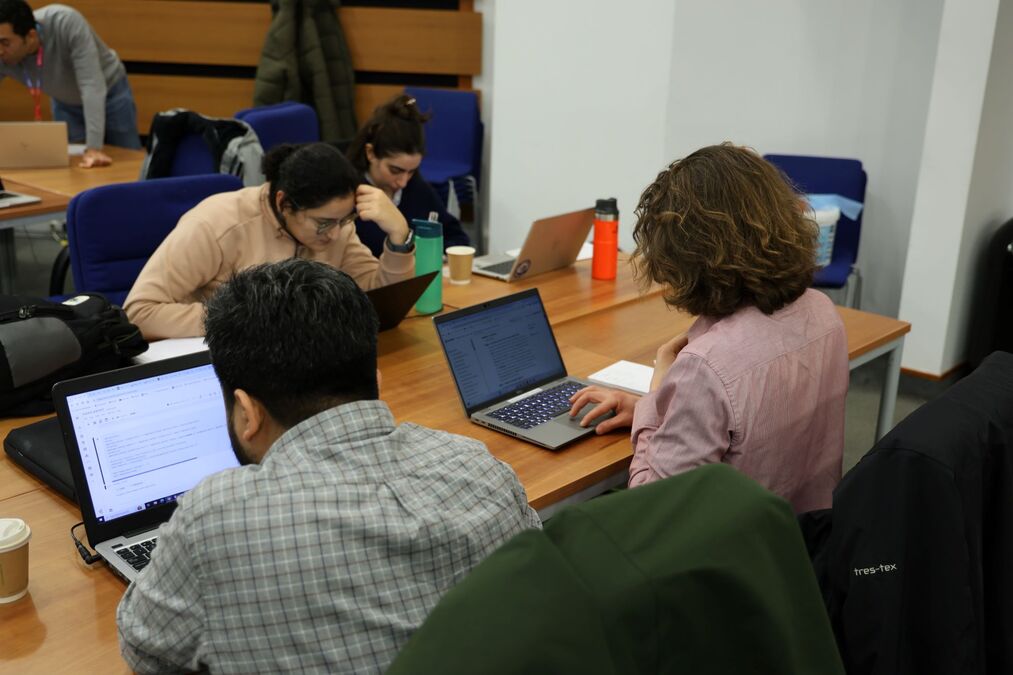Published:

ECO-AI Workshop and Hackathon Fuels Innovation in Carbon Capture and Storage
From March 11th to March 15th, 2024, Heriot-Watt University hosted an exciting event aimed at harnessing the power of artificial intelligence (AI) to tackle the pressing challenge of achieving Net Zero through carbon capture and storage (CCS). The ECO-AI Workshop and Hackathon brought together a diverse array of researchers, professionals, and students passionate about leveraging AI-driven solutions to combat climate change and achieve Net Zero targets.
Professor Ahmed H. Elsheikh from the School of Energy, Geoscience, Infrastructure and Society at Heriot-Watt University is the project lead. He commented,
"The ECO-AI Workshop and Hackathon signifies a significant stride forward toward Net Zero goals. By integrating AI, we're delving into promising territory for sustainability. It's a reminder that with concerted effort and persistence, we're making tangible progress in tackling the complexities of carbon capture and storage."
Exploring AI Solutions for CCS
The two-day workshop kicked off with engaging sessions led by renowned experts from the ECO-AI project team at Heriot-Watt University and Imperial College London. Participants delved into a wide range of topics during the AI4NZ project talks and academic presentations. These included discussions on Digital twins and decision making for Net Zero under uncertainty, as well as incorporating surrogates into large-scale deterministic optimization models for integrated decision-making in complex systems. Additionally, academic talks covered topics such as Hybrid AI and physical modelling for accurate and rapid environmental prediction and management, optimizing carbon capture using molecular- and macro-scale modelling, data, and AI/ML, and upscaling the porosity–permeability relationship of a microporous carbonate for Darcy-scale flow with machine learning.
In the industry talks, themes ranged from AI for science with a focus on applications to imaging and large-scale experiments to discussions on SSE thermal's vision for CCUS in the UK. Other topics included measurements, monitoring & verification of a CCS site: insights and technology developments, as well as the AI potential in CCS Deployment from an 'industrial' perspective. Throughout these discussions, attendees explored innovative AI applications, including AI materials discovery for energy-efficient CO2 capture and AI-solvers for modelling CO2 flow in geological storage formations. Special guest speakers from other UKRI-funded projects under the AI for NetZero research initiative provided valuable insights, fostering collaborative learning and knowledge exchange.
Hackathon: Collaborative Problem-Solving
Following the workshop, participants embarked on a three-day hackathon, where they were challenged to work on unique problems related to CO2 capture, CO2 storage, and CCS policy and economics. Teams consisting of PhD students, and post-doctoral research associates from across the UK collaborated to develop AI-driven solutions. With access to tools, support, and data provided by Heriot-Watt University and Imperial College London experts, participants tackled challenges such as materials discovery, subsurface flow modelling, and clustering of CCS patents all using AI.
Networking and Collaboration
The event provided opportunities for networking and collaboration, allowing participants to connect with leading scientists, professionals, and industry experts in the field of environmental sciences. Through thought-provoking discussions and mentorship sessions, attendees gained valuable insights into AI's role in achieving Net Zero targets and addressing the challenges of CCS technologies.
“I was very impressed with the workshop, but especially so with the enthusiasm and energy in the hackathon. Students and postdocs from both within and outside the ECO-AI project coded for three days working on various AI models related to the ECO-AI project,”
said Clare McCabe, Bicentennial Professor in the School of Engineering and Physical Science and co-leader of the carbon capture component of the ECO-AI project.
Looking to the Future
As the workshop and hackathon concluded, participants left with a sense of accomplishment and renewed determination to drive positive change in the fight against climate change. The event served as a catalyst for collaboration and innovation, paving the way for future advancements in AI-driven solutions for CCS. With continued research and collaboration, the path towards a sustainable future powered by AI-driven technologies grows ever clearer.
The ECO-AI Workshop and Hackathon exemplified the power of collective action in addressing global challenges, underscoring the importance of collaboration, innovation, and determination in building a more sustainable world for future generations.
Peter Cummings, Bicentennial Professor in the School of Engineering and Physical Science, said
“This workshop shows how the ECO-AI project is contributing to the broader goals of reaching net zero greenhouse gas emissions by harnessing the tools of artificial intelligence and machine learning. It fits in very well with our university-wide goals in net zero.”
Cummings is co-leader of the Heriot-Watt Global Research Institute for attaining Net Zero and Beyond (iNetZ+), an interdisciplinary institute established by Heriot-Watt in 2023. iNetZ+ will bring in 55 new academic staff and over 30 support staff during the next 5-7 years.